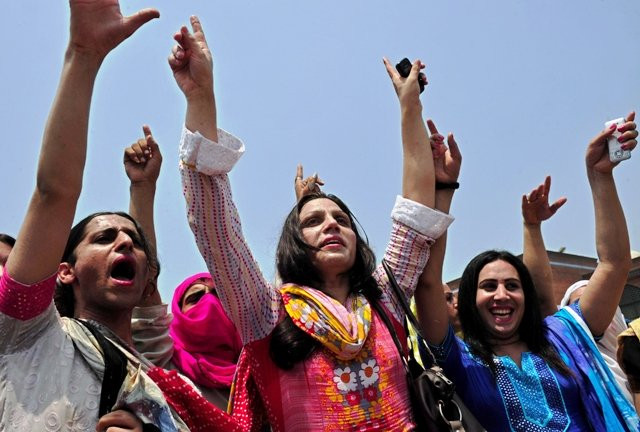A lonely Eid: ‘If they can accept the money, why not the sender?’
People who are transgender buy gifts for their families who want nothing to do with them

People who are transgender buy gifts for their families who want nothing to do with them. PHOTO: AFP
“We celebrate with our community,” Lovely tells The Express Tribune.
“We dance, sing and even cry during celebrations as everyone misses their parents and other family members” she adds, applying the finishing touches to her makeup by putting on mascara.
Lovely left her home in Karachi around four years ago at the age of 13 as she felt that her presence had become an embarrassment for her family and relatives and in the colony. She recalls that her father would beat her if anything went wrong.
Regardless, Lovely still misses family, especially her younger sisters and mother. She sends gifts for them every Eid. While showing presents she has bought for them, such as colourful bangles, frocks for her sisters and clothes for mother and father, Lovely reveals that she collects money throughout the year for the occasion.
“It makes me feel that these gifts will remind them of me,” she says. “Otherwise, I know they have forgotten me.”
When she left her house, Lovely took shelter in the sanctuary of a transgender in Karachi. However, when she was raped by a group of men in the metropolis, she left Karachi and moved to Peshawar.
“I don’t go back to Karachi even though I miss my mother and sisters a lot,” she says with tears welling up in her eyes.
She remembers that her sisters were very little when she left them. Lovely says her mother was her best friend, but this cruel society forced her to leave.
“They don’t ask me how I earn money to send these gifts,” she explains. “I also send money. Sometimes I do wonder; if they can accept the money; why not the person who sends it?”
Govt announces four-day Eid holiday
Her friend Ayesha, another person who is transgender, is also busy preparing gifts to send to her family.
Combing her long hair to hide her tearstained eyes, she says, “On Eid day, when people meet relatives, I lock myself in my room and cry until the whole day passes.”
The 25-year-old still remembers the warmth of her mother’s lap. “When I was a child, she used to hold me in her arms and I still remember her preparing vermicelli every Eid.
Living in a society where people who are transgender are mainly known for their performances at weddings and other functions, members of the community are never the subject of unconditional love. They live life without their blood relatives and are considered as freaks or aliens.
Unacceptable to mainstream society, they tend to live in close-knit groups. However, exposure to the outside world is limited to dancing, performances at functions and begging.
Their families do not even accept their presence at home during Eid, an occasion that is mostly about family and togetherness. The few that are allowed to visit their birth homes are told to come after dark. Devoid of the love of their own blood, they support each other like family and lift each other’s spirits.
Farzana, a guru of the transgender community who lives near Gulbahar, told The Express Tribune it is not only occasions like Eid when they feel lonely.
“We are not blood relatives, but when we miss our family members, we embrace and console each other,” she says. “My sisters and brothers were getting married, but they did not invite me because I am neither man nor woman. They only called me once when my sister died. I visited her house for 15 minutes and left.”
Published in The Express Tribune, June 29th, 2016.













COMMENTS
Comments are moderated and generally will be posted if they are on-topic and not abusive.
For more information, please see our Comments FAQ